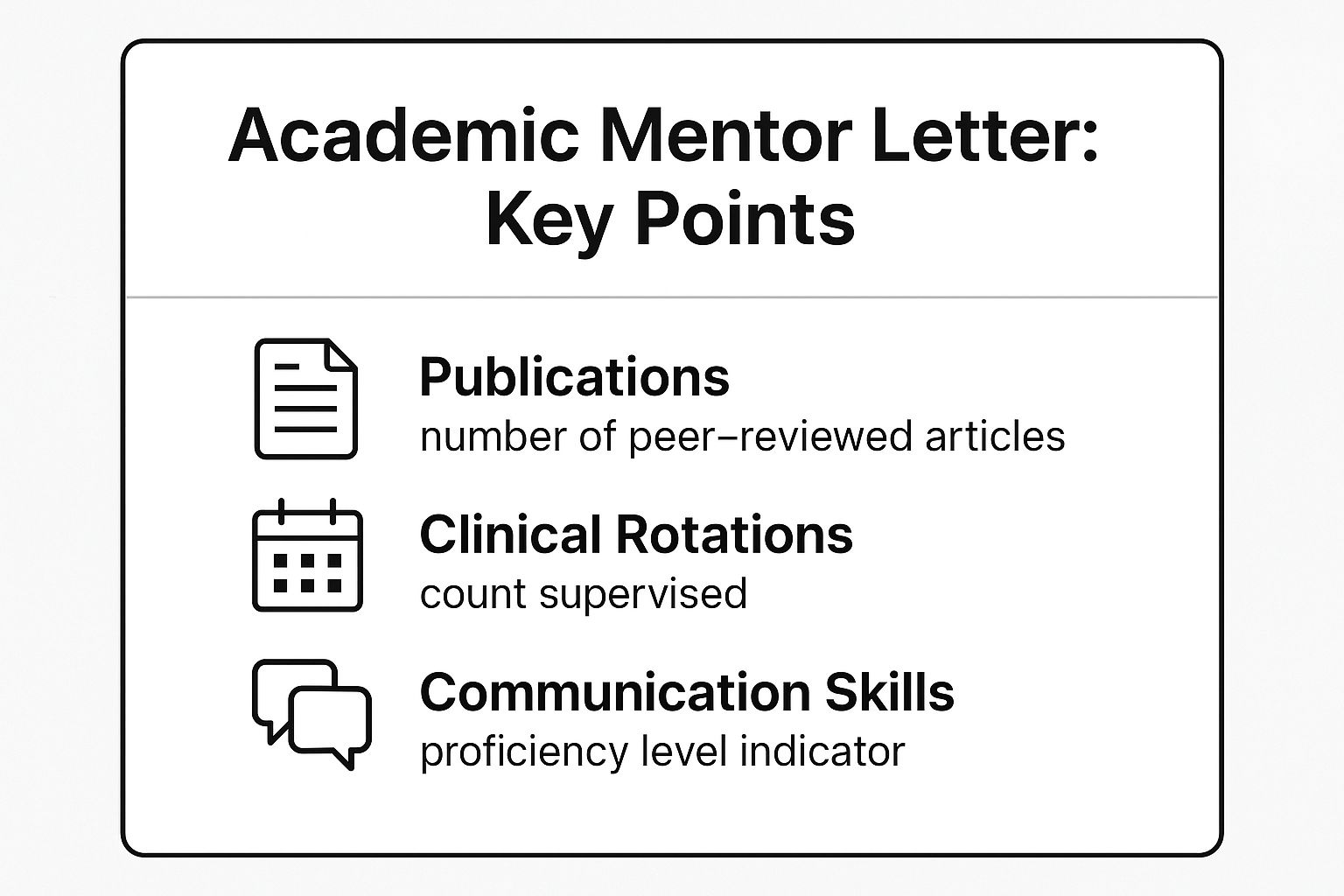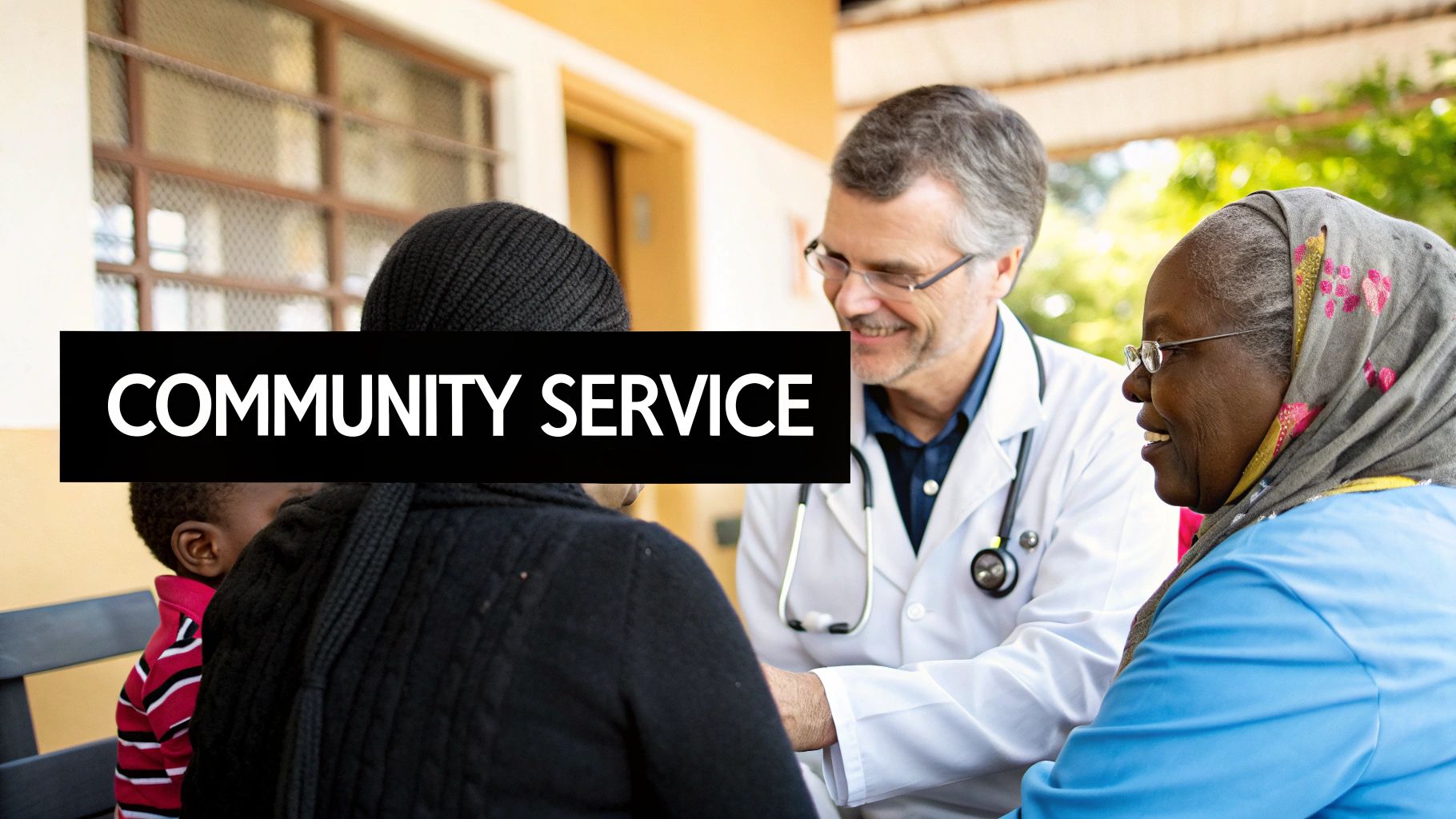The residency match is more competitive than ever, and a powerful letter of recommendation (LOR) can be the deciding factor that sets you apart. While your USMLE scores and clinical grades are crucial, a compelling LOR provides a narrative to your numbers, offering program directors a glimpse into your clinical acumen, professionalism, and potential as a future resident. But what separates a generic, template-based letter from one that truly champions your candidacy?
This guide moves beyond generic advice to dissect six distinct types of LORs you'll encounter during your application process. We provide a deep strategic analysis of an actual sample letter of recommendation for residency for each category, from clinical preceptors to research mentors. The goal is to show you not just what makes a letter effective, but also how to strategically position yourself to receive one that opens doors. Just as understanding how to write compelling content that resonates with an audience is key for writers, a strong LOR must resonate with program directors.
We will break down the structure of each example, highlight key phrases that signal excellence, and provide actionable takeaways you can implement immediately. This ensures your letters of recommendation are as strong as every other component of your ERAS application, making your profile unforgettable.
1. Academic Mentor/Research Supervisor Letter
An academic mentor or research supervisor letter is often the most powerful component of a residency application. This letter comes from a faculty member who has worked closely with you in a scholarly or clinical setting, providing program directors with a detailed, evidence-backed assessment of your abilities. Unlike a letter from a brief elective, this recommendation speaks to your long-term performance, intellectual curiosity, and professional growth.
This type of letter is crucial because it provides concrete examples of your skills. A research mentor can discuss your specific contributions to a project, your problem-solving abilities when experiments failed, and your dedication to seeing a manuscript through to publication. Similarly, a faculty mentor who supervised you on multiple clinical rotations can comment on the tangible development of your clinical reasoning and patient care skills over time.
Why This Letter Matters
This letter validates the claims you make in your CV and personal statement. It moves beyond grades and test scores to paint a picture of who you are as a future physician and colleague. It demonstrates your capacity for scholarly activity, a key consideration for academic residency programs.
For instance, a letter from an internal medicine research supervisor might detail your journey from learning basic lab techniques to presenting your findings at a national conference. This narrative is far more compelling than simply listing the presentation on your CV. It offers a "behind-the-scenes" look at your resilience, analytical skills, and communication prowess.
Actionable Strategy: Empower Your Letter Writer
To get a stellar sample letter of recommendation for residency, you must be proactive. Don't just send a request; provide a comprehensive packet of materials to your mentor.
- Your Updated CV: This gives them a full overview of your accomplishments.
- Your Personal Statement: This helps them understand your motivations and career goals, allowing them to tailor their letter to your narrative.
- A "Brag Sheet": Create a concise, one-page document reminding them of specific projects you worked on together, key achievements, and any memorable clinical cases or challenges you overcame.
This infographic provides a quick reference to the key data points an academic mentor can highlight in their letter.

As the data shows, this type of letter quantifies your achievements, transforming abstract qualities into measurable contributions like publications and clinical experience. These metrics provide residency programs with the specific, impactful evidence they need to evaluate your candidacy effectively.
2. Clinical Clerkship Director Letter
A letter from a clinical clerkship director provides a direct assessment of your hands-on skills in a real-world patient care environment. This recommendation comes from a faculty leader who has formally observed your performance, professionalism, and teamwork during a core or elective rotation. It offers residency programs a standardized, credible evaluation of your clinical competency and bedside manner.

Unlike a research letter that focuses on academic potential, this letter emphasizes your readiness for the clinical demands of residency. A clerkship director can speak to your ability to take a patient history, formulate a differential diagnosis, and present a concise plan on rounds. Their endorsement is particularly powerful for specialty-specific applications, confirming your suitability for that field.
Why This Letter Matters
This letter serves as objective proof of your clinical abilities, endorsed by a leader within a department. It is often considered less biased than a letter from a mentor you hand-picked, as the director's perspective is based on formal evaluations and direct observations from the entire clerkship team. This type of endorsement is highly valued by program directors seeking candidates who can hit the ground running.
For example, a letter from an emergency medicine clerkship director might highlight your composure during a trauma code or your efficiency in managing multiple patients. A pediatrics director could describe your exceptional rapport with a challenging pediatric patient and their family. These specific anecdotes provide tangible evidence of the skills you will bring to their residency program.
Actionable Strategy: Be a Memorable Clerk
To secure a strong sample letter of recommendation for residency from a clerkship director, you must make a consistently positive impression throughout the rotation. Your performance is your primary tool for earning a standout letter.
- Engage Actively: Don't just show up; participate. Ask thoughtful questions during rounds, volunteer for new patient workups, and stay late to help the team.
- Seek Feedback: Proactively ask residents and attendings for feedback on your presentations and notes. This demonstrates a commitment to improvement and professional growth.
- Document Your Contributions: Keep a brief journal of interesting cases, your role in them, and any positive feedback you received. Provide this to the director as a "reminder sheet" when you make your request.
This video offers further insight into how to excel during your clinical clerkships to earn the strongest possible evaluations and letters.
By making a deliberate effort to be an outstanding team member, you provide the clerkship director with ample positive material to write a compelling and detailed letter that will significantly strengthen your application.
3. Department Chair/Program Director Letter
A letter from a department chair or a residency program director (from your home institution) is a high-impact endorsement that carries significant institutional weight. This letter provides a macro-level perspective on your candidacy, speaking to your overall performance, standing within your class, and suitability for the specialty. It signals to receiving programs that you are a highly regarded candidate within your own medical school's department.
This type of letter is powerful because the writer is a recognized leader in the field. Their recommendation is based not just on a single rotation but on a comprehensive view of your academic record, clerkship evaluations, and institutional involvement. It often serves as a "dean's letter" for a specific specialty, summarizing your strengths from an authoritative standpoint.
Why This Letter Matters
This letter acts as a powerful institutional validation of your application. When a department chair from a respected institution endorses a candidate, it sends a clear message about that applicant's quality and potential. This is especially crucial for competitive specialties where program directors rely on trusted colleagues to vet top applicants.
For example, a letter from your home institution's surgery department chair might highlight that you are ranked among the top 5% of students pursuing surgery this year. It could also mention your consistent "Honors" grades in all surgical sub-specialty clerkships and your leadership role in the student surgical society. This overarching summary complements the granular detail provided by individual rotation preceptors.
Actionable Strategy: Achieve High-Level Visibility
To secure a strong sample letter of recommendation for residency from a department head, you need to be more than just a name on a roster. You must strategically build a reputation for excellence.
- Excel Consistently: Your primary task is to achieve high marks across all relevant clerkships and sub-internships within that department. Consistent excellence is the most effective way to get on a chair's radar.
- Engage in Departmental Activities: Participate in specialty interest groups, attend departmental grand rounds, and present at local research symposiums. This demonstrates genuine commitment and provides opportunities for interaction.
- Schedule a Meeting: Once you have established a strong record, schedule a formal meeting with the chair or program director to discuss your career goals and request a letter. Come prepared with all your supporting documents. Managing this request is a key step, so be sure to understand the full residency application timeline to time it correctly.
4. Attending Physician Letter
An attending physician letter is a cornerstone of the residency application, providing a direct assessment of your clinical abilities in a real-world setting. This recommendation comes from a physician who supervised you during a core rotation, sub-internship, or an elective. It offers program directors a firsthand account of your hands-on skills, patient interactions, and ability to function as part of a medical team.

This type of letter is essential because it moves beyond academic performance to evaluate your practical competence. A strong letter from an attending will detail your clinical reasoning, procedural skills, and professionalism under pressure. It provides a credible, third-party validation of your readiness for the responsibilities of a resident physician.
Why This Letter Matters
This letter is your proof of clinical readiness. It shows program directors that you can apply your knowledge effectively and work collaboratively in a demanding environment. It’s one thing to excel on an exam; it's another to demonstrate compassion and sound judgment at a patient's bedside.
For example, a letter from a surgical attending might describe your technical proficiency in the operating room, your ability to anticipate the needs of the surgical team, and your diligence in post-operative patient care. An ICU attending could highlight your calm demeanor during a crisis and your skill in presenting complex cases. These specific anecdotes provide powerful evidence of your capabilities. To see how these details are woven into a narrative, you can review a detailed sample letter of recommendation for residency and learn more about crafting a compelling attending physician letter.
Actionable Strategy: Be an Unforgettable Student
To earn a glowing letter, you must make a lasting, positive impression. Your performance during the rotation is your audition for the recommendation.
- Show Genuine Initiative: Arrive early, stay late, and actively seek out learning opportunities. Volunteer to see new patients and follow up on their progress, even when not explicitly required.
- Prepare Meticulously: Know your patients inside and out before rounds. Be prepared to discuss their cases thoroughly, including differential diagnoses and management plans.
- Be a Team Player: Demonstrate professionalism and respect for every member of the healthcare team, from nurses and therapists to administrative staff. Your ability to collaborate is a key indicator of your future success as a resident.
5. Research Principal Investigator Letter
A letter from a Research Principal Investigator (PI) offers a specialized and highly respected endorsement for residency applicants, particularly those aiming for academic medicine or research-heavy specialties. This recommendation comes from the leader of a lab or research group who has directly supervised your scholarly work. It provides an in-depth evaluation of your scientific acumen, analytical skills, and potential as a physician-scientist.
This type of letter is distinct because it focuses on qualities not always visible in clinical rotations. A PI can speak to your intellectual curiosity, your systematic approach to problem-solving, and your resilience in the face of experimental setbacks. They can detail your specific contributions to a project, from experimental design and data acquisition to analysis and manuscript preparation, offering a powerful narrative of your scientific journey.
Why This Letter Matters
This letter substantiates your interest in scholarly activity and demonstrates your capability to contribute to the field beyond clinical care. It is a critical piece of evidence for competitive programs that value research and expect residents to engage in academic pursuits. For specialties like dermatology, neurosurgery, or radiation oncology, a strong research letter can be a significant differentiator.
For example, a PI from an NIH-funded lab can describe how you independently troubleshooted a complex assay, leading to a breakthrough that advanced the project. They might highlight your initiative in drafting a portion of a manuscript or your clarity in presenting complex data at lab meetings. This provides a compelling, evidence-based portrait of your potential as a future academic leader and collaborator.
Actionable Strategy: Be an Indispensable Team Member
To secure a powerful sample letter of recommendation for residency from a PI, you must move beyond simply completing assigned tasks. Your goal is to become an integral part of the research team.
- Demonstrate Initiative: Don't wait to be told what to do. Read relevant literature, propose new ideas or modifications to protocols, and take ownership of your part of the project.
- Communicate Your Goals: Schedule a meeting with your PI to discuss your residency aspirations and how your research experience fits into your career plans. This context helps them write a more targeted and impactful letter.
- Provide a Research Summary: In addition to your CV and personal statement, give your PI a one-page summary of your research contributions. Detail the specific techniques you mastered, the hypotheses you tested, and the outcomes of your work, including any presentations or publications.
6. Community Physician/Volunteer Supervisor Letter
A letter from a community physician or a volunteer supervisor offers a unique and valuable perspective on your character and commitment. This recommendation comes from someone who has witnessed your work outside the structured environment of an academic medical center, showcasing your dedication to service, your cultural competency, and your ability to connect with diverse patient populations on a human level.

This type of letter is essential because it demonstrates attributes that are difficult to quantify through grades or board scores. A free clinic director can speak to your empathy and tireless work ethic, while a community preceptor can highlight your adaptability and patient-centered approach in a resource-limited setting. These experiences prove that your desire to practice medicine is rooted in genuine altruism.
Why This Letter Matters
This letter humanizes your application, providing a narrative of your service-oriented values. It complements the academic and clinical letters by painting a more holistic picture of who you are. For programs with a strong focus on community health, primary care, or serving underserved populations, this letter can be a deciding factor.
For example, a glowing recommendation from a supervisor at a student-run free clinic can detail how you consistently took on extra shifts, patiently educated patients about their chronic conditions, and worked to overcome language barriers. This story of compassionate service provides powerful, real-world evidence of your commitment, a key topic often explored during interviews. Getting ready for these conversations is a critical part of your overall application, and you can find excellent guidance in our medical residency interview preparation resources.
Actionable Strategy: Demonstrate Sustained Commitment
To earn a meaningful community-based sample letter of recommendation residency, you must invest your time and energy authentically. A superficial or short-term engagement will not yield a strong letter.
- Choose Meaningful Activities: Select volunteer or community clinical experiences that align with your personal and professional values.
- Show Long-Term Dedication: Commit to an organization for an extended period. Consistency allows your supervisor to observe your growth and gather specific examples of your contributions.
- Be Proactive and Reliable: Go beyond the minimum requirements. Take initiative on projects, be a dependable team member, and actively seek opportunities to connect with the community you are serving.
When you ask for the letter, provide your supervisor with your CV and personal statement, and remind them of specific instances where you made a tangible impact. This helps them write a detailed and personal letter that truly reflects your character and dedication.
Residency Recommendation Letters Comparison
| Letter Type | 🔄 Implementation Complexity | 💡 Resource Requirements | 📊 Expected Outcomes | 💡 Ideal Use Cases | ⭐ Key Advantages |
|---|---|---|---|---|---|
| Academic Mentor/Research Supervisor Letter | Moderate – requires detailed input and collaboration | Requires access to academic records, CV, research details | Strong demonstration of research and clinical skills | Research-focused residencies, academic medicine | Specific examples, combines clinical & research |
| Clinical Clerkship Director Letter | Low to Moderate – based on clinical rotations | Requires direct clinical observation and standardized metrics | Clear assessment of clinical proficiency and professionalism | Core clinical rotations, specialty-specific skills | Credible clinical evaluation, highlights real-world skills |
| Department Chair/Program Director Letter | Moderate – involves high-level institutional input | Needs broad performance data and leadership examples | Comprehensive overview with institutional endorsement | Overall candidate assessment, leadership roles | High authority, institutional weight |
| Attending Physician Letter | Moderate – depends on clinical exposure duration | Requires close clinical interactions and patient care examples | Detailed insight into hands-on clinical skills and adaptability | Clinical rotations, sub-internships, electives | Practical clinical perspective, specialty relevance |
| Research Principal Investigator Letter | Moderate to High – focused on research outputs | Access to detailed research activities and publications | Highlights scientific methodology and academic potential | Research-heavy residencies and academic careers | Essential for research pathways, scholarly impact |
| Community Physician/Volunteer Supervisor Letter | Low – based on community service involvement | Requires engagement in community or volunteer settings | Demonstrates commitment to service and cultural competency | Community-based roles, underserved populations | Shows service dedication, cultural awareness |
From Request to Reality: Securing Your Strongest Endorsements
Securing powerful letters of recommendation is not a passive process; it is a strategic campaign that begins long before you click 'submit' on ERAS. As we have seen through the detailed analysis of each sample letter of recommendation for residency, every endorsement serves a unique and critical purpose. The goal is to curate a portfolio of letters that, when viewed together, create a comprehensive, multi-faceted, and compelling portrait of you as a future resident.
The examples in this article, from the detail-oriented research PI to the clinically focused attending physician, illustrate a fundamental truth: specificity wins. Generic praise is easily forgotten, but a letter filled with concrete examples of your clinical reasoning, teamwork, and compassionate care leaves a lasting impression on program directors. Your task is to facilitate that level of detail.
Synthesizing Your Strategy: Key Takeaways
To transform this knowledge into action, focus on these core principles:
- Cultivate Relationships Early: Meaningful mentorship and professional connections are not built overnight. Identify potential writers early in your medical school career and invest time in those relationships, demonstrating your commitment and work ethic long before you need to make the request.
- Arm Your Writers for Success: Never assume your letter writers remember every detail about your performance. Provide them with a well-organized packet including your CV, personal statement, a list of programs you're applying to, and a "brag sheet" with specific, memorable anecdotes from your time working with them. This is the single most effective way to ensure a personalized letter.
- Diversify Your Portfolio: Aim for a set of letters that showcases different aspects of your candidacy. An academic letter highlights your intellectual curiosity, a clinical letter proves your patient care skills, and a research letter demonstrates your analytical abilities. Together, they tell a complete story.
Your Actionable Next Steps
Mastering the art of securing a strong sample letter of recommendation residency is a significant step, but it's part of a larger application narrative. The communication and strategic planning skills you hone here are highly transferable. For instance, the ability to present a concise, persuasive case for your qualifications is also vital when learning about crafting a compelling letter of intent for a visa application, a task many international medical graduates will face.
By proactively managing this process, you are not just collecting documents; you are actively shaping how residency programs perceive you. You are moving from a name on a list to a candidate they are excited to meet. Embrace this opportunity to advocate for yourself and ensure your application reflects the full scope of your potential.
Navigating the complexities of the residency match requires more than just strong scores; it demands a flawlessly executed strategy. If you need expert guidance to ensure every component of your application is optimized for success, from your personal statement to your interview skills, connect with the specialists at Ace Med Boards. Let us help you transform your hard work into your first-choice residency.
